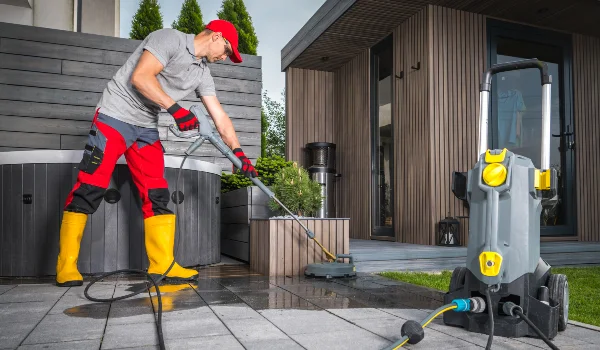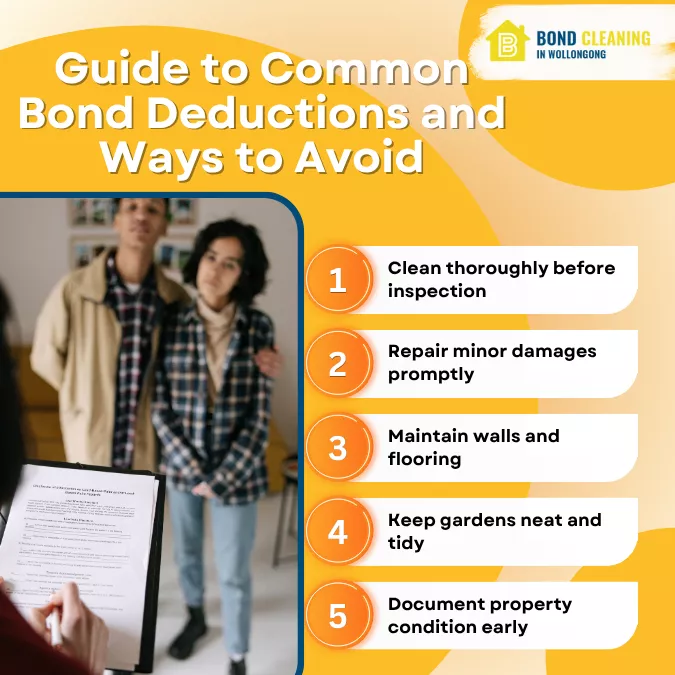Common Reasons for Bond Deductions and How to Avoid Them
Receiving your bond back at the end of a tenancy feels like a final reward for all of the bills and maintenance you’ve handled during your stay. However, for many Wollongong tenants, that moment can rapidly become stressful when the landlord points out damage or cleanliness issues that you may not have noticed. Suddenly, a portion of your bond money is withheld; leaving you dissatisfied and wondering what went wrong.
However, bond deductions are more common than you might think and they often result from minor oversights rather than major damage. From dirty carpets and stained walls to neglected outdoor areas, every detail is important during the final inspection. This article will look at the most prevalent reasons for bond deductions and how to avoid them. Whether you plan to tackle the cleanup yourself or hire top quality end of lease cleaning Wollongong services, these tips will help you walk away with your entire bond intact.
Hide
Show
- Incomplete or Poor End of Lease Cleaning
- Damage Beyond Normal Wear and Tear
- Neglected Carpets and Upholstery Cleaning
- Unattended Outdoor Areas and Gardens
- Missed Repairs and Property Maintenance
- Leftover Rubbish and Personal Items
- Failure to Document Property Condition
- Poor Communication with the Landlord or Property Manager
- Infographic: Guide to Common Bond Deductions and Ways to Avoid
- Wrapping Up
1. Incomplete or Poor End of Lease Cleaning
One of the top reasons for bond deductions, is an inadequate end of lease clean. Landlords expect the property to be returned in the same condition, it was in at the beginning of the tenancy, excluding normal wear and tear. Unfortunately, many tenants misunderstand how detailed this cleaning process should be. Skipping tasks like cleaning behind appliances, wiping skirting boards, or washing windows can result in immediate deductions.
To avoid this, create a detailed cleaning checklist for each room and corner of your home. Consider commonly overlooked areas including light fixtures, blinds, and exhaust fans. If you are concerned about meeting the expected standard, hiring professional cleaners who specialise in end of lease cleaning Wollongong is a good decision. They follow specific cleaning checklists set by real estate brokers, ensuring that no detail is ignored and your property is inspection ready.
2. Damage Beyond Normal Wear and Tear
Another major reason tenants lose part of their bond is due to property damage that goes beyond ordinary use. Small scuffs on walls or minor carpet wear are generally accepted, but broken fittings, holes in walls, or burn marks on countertops are not. Landlords or agents will often deduct the cost of repairs directly from your bond to restore the property.
Preventing this requires both care and regular maintenance during your tenancy. Avoid using adhesives that can strip paint, cover floors with mats or rugs, and handle fixtures with care. If there is any damage, it is best to report it and get it repaired before the final inspection. Minor repairs, such as repairing a small nail hole or replacing a cracked tile, can help to avoid considerably greater deductions in the future. Transparency and prompt repairs always make a better impression than last minute cover ups.
3. Neglected Carpets and Upholstery Cleaning
Carpets and upholstery tend to trap dirt, dust, and odours over time, especially if you have pets or children. Many tenants forget that regular vacuuming is not enough to keep them in good condition. Stains, spills, or deep grime can make carpets look aged and lead to cleaning or replacement costs being taken out of your bond.
Before leaving, be sure to thoroughly clean your carpets and upholstery. You can rent a steam cleaner, but professional carpet cleaners usually produce considerably superior results. Many end of lease cleaning Wollongong packages include carpet and upholstery cleaning as part of the service, ensuring that any stains and odours are eliminated. Taking this step not only impresses your landlord, but it also gives the entire property a fresh feel during inspection.
4. Unattended Outdoor Areas and Gardens

If your rental includes an outdoor area, garden, or balcony, ignoring it can easily result in a deduction. The most typical problems are overgrown lawns, weed filled flower beds, and unclean patios. Property managers see these areas as an extension of your home, so they want them to be well kept when you leave.
Before your final inspection, mow the lawn, trim hedges, and remove any weeds or rubbish. Sweep patios and clear out cobwebs or debris. For tenants living in apartments, clean the balcony floors, wipe railings, and ensure drains are unclogged. If outdoor maintenance is not your strong suit, consider hiring local gardeners or cleaning services to handle this part. Keeping your outdoor space tidy adds a strong visual impression and prevents any unnecessary deductions.
5. Missed Repairs and Property Maintenance
A leaky tap, a flickering light bulb or a faulty door handle may appear little; but landlords typically withhold maintenance money at the end of the lease. Small flaws can build over time indicating to your landlord that the property was not properly maintained. Even if you did not cause the damage; neglecting to repair it can jeopardise your bond return.
To avoid this conduct a thorough property inspection, a few weeks before moving out. Make a list of all minor repairs that need attention and fix them beforehand. Replace light bulbs, tighten screws and make sure that all fixtures and appliances are working properly. Document everything with photos or receipts if you have hired professionals for repairs; this can help if any disputes arise later. Proactive maintenance shows responsibility and increases your chances of receiving a full refund.
6. Leftover Rubbish and Personal Items
Leaving behind trash, furniture, or personal belongings is another surprising common reason for bond deductions. Many tenants focus on cleaning but neglect to clean out the garage, cupboards, and storage areas. Property managers usually charge disposal fees for goods left behind, which are deducted immediately from your bond.
Make sure to declutter and dispose of unwanted items responsibly before you vacate. Donate usable furniture, recycle old materials, and schedule a rubbish collection if needed. Perform a final walk through to ensure that every area, from wardrobes to kitchen drawers, is empty. A fully clean house indicates preparedness for the next tenant and ensures you are not fined for post departure cleaning or removal tasks.
7. Failure to Document Property Condition
Uncertainty in property condition records usually leads to disagreements over bond deductions. If you did not take detailed photos at the start and end of your tenancy, documenting the property’s original condition can be challenging. Without evidence, landlords may claim that specific damages or sanitary issues occurred during your stay.
Always fill out a condition report during the move in and move out periods. Take dated photographs of each room, including closeups of any current damage or wear. Share copies with your property manager or landlord to maintain openness. When it comes time for your final inspection, this documentation will serve as proof of your care, allowing you to avoid unnecessary deductions.
8. Poor Communication with the Landlord or Property Manager
Bond deductions might occur, as a result of simple communication errors. Tenants who do not explain expectations or notify landlords about urgent repairs; may face unpleasant surprises later. For example, a landlord may charge cleaning expenses presuming you did not complete a specified task when, in fact, you did.
Maintain clear, polite communication throughout your tenancy, especially towards the end. Confirm the cleaning and maintenance standards expected, ask for clarification when needed, and keep written records of all correspondence. A proactive and transparent approach helps build trust, often leading to smoother inspections and fairer outcomes.
Infographic: Guide to Common Bond Deductions and Ways to Avoid

Wrapping Up
Bond deductions can be stressful, but they are not inevitable. Most issues arise from simple oversights, like skipping a deep clean, ignoring small repairs, or failing to document the property’s condition. With careful planning and attention to detail, you can easily avoid these pitfalls. Remember, your bond money represents your effort and responsibility as a tenant, so with the right approach, you can make sure it comes right back to you, hassle free.

